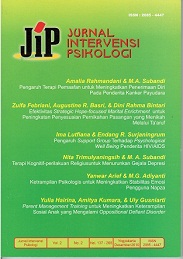Main Article Content
Abstract
Biological, psychological, social, and spiritual impacts of cancer can cause the emergence of negative emotions and affect patient's self-acceptance. Forgiveness therapy is expected to enhance patient's acceptance by releasing them from the negative emotional prison, changing attitudes toward self, others, and/or the situation become more positive, and setting new life goals. This study examined the effect of forgiveness therapy to increase forgiveness and self-acceptance of breast cancer patients. Therapy was given as much as 6 sessions, conducted once a week, for about 80 minutes. Participant was a women who had a breast cancer, had an average score of forgiveness and self-acceptance on the baseline phase measurement. Research design wasA-B-A single-case experimental studies with 3 times forgiveness's measurement, each before intervention, after intervention, and follow-up 2 weeks after intervention. Self-acceptance's measurement was conducted 10 times, 3 times in the baseline phase (before intervention), 6 times in the intervention phase (end of each session), 1 time in reversal phase (follow-up 2 weeks after intervention), with 1 week measurement interval. Hypothesis was tested by using visual inspection and qualitative analysis based on documents during the process of therapy and follow-up interview. The results showed that forgiveness therapy could improve participant's forgiveness and self-acceptance. Changes in both dependent variable remained stable at follow-up. The limitations of this study were further discussed.
Keywords: forgiveness, self-acceptance, breast cancer patients



